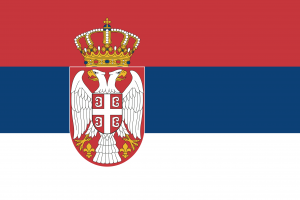Difference between revisions of "Language/Serbian/Grammar/Verbs:-Future-Tense"
m (Quick edit) |
m (Quick edit) |
||
| Line 109: | Line 109: | ||
===Serbian Lesson 24 - 100 most common Serbian verbs Learn ...=== | ===Serbian Lesson 24 - 100 most common Serbian verbs Learn ...=== | ||
<youtube>https://www.youtube.com/watch?v=XVPI8qxTkkY</youtube> | <youtube>https://www.youtube.com/watch?v=XVPI8qxTkkY</youtube> | ||
==Related Lessons== | |||
* [[Language/Serbian/Grammar/Adjectives|Adjectives]] | |||
* [[Language/Serbian/Grammar/How-to-Use-Be|How to Use Be]] | |||
* [[Language/Serbian/Grammar/Gender|Gender]] | |||
* [[Language/Serbian/Grammar/Pronouns|Pronouns]] | |||
* [[Language/Serbian/Grammar/Present-Tense|Present Tense]] | |||
* [[Language/Serbian/Grammar/Verbs:-Past-Tense|Verbs: Past Tense]] | |||
* [[Language/Serbian/Grammar/Verbs:-Present-Tense|Verbs: Present Tense]] | |||
* [[Language/Serbian/Grammar/Nouns|Nouns]] | |||
* [[Language/Serbian/Grammar/Imperative-Tense|Imperative Tense]] | |||
* [[Language/Serbian/Grammar/Indefinite-Articles-in-Serbian|Indefinite Articles in Serbian]] | |||
{{Serbian-Page-Bottom}} | {{Serbian-Page-Bottom}} | ||
Revision as of 13:00, 12 March 2023
As a Serbian language teacher who has been teaching for 20 years, I'm excited to continue with our beginner course and introduce you to the future tense in Serbian verbs. Learning the future tense is a crucial part of mastering the language, as it will allow you to talk about things that haven't happened yet. In this lesson, we'll explore how to form the future tense and when to use it. So, let's dive in!
The Future Tense in Serbian
In Serbian, the future tense is used to talk about future actions. To form the future tense in Serbian, we use the auxiliary verb "će" (pronounced 'cheh') meaning "will" followed by the main verb in the infinitive form.
Here is an example:
| Serbian | Pronunciation | English |
|---|---|---|
| Ја ћу писати | ya chuu pee-sa-tee | I will write |
| Ти ћеш читати | tee chesh chee-ta-tee | You will read |
| Он ће говорити | on cheh go-vo-ree-tee | He will speak |
| Она ће пети | o-na cheh peh-tee | She will sing |
It's important to note that the auxiliary verb "će" changes depending on the subject of the sentence:
| Person | Auxiliary Verb |
|---|---|
| Ја | ћу |
| Ти | ћеш |
| Он / Она / Оно | ће |
| Ми | ћемо |
| Ви | ћете |
| Они / Оне / Она | ће |
This table shows us how to adjust the auxiliary verb "će" to correspond with the subject of the sentence. We'll examine this further in the following paragraphs.
How to Use the Future Tense in Serbian
The future tense in Serbian is used to talk about events that will happen in the future. In other words, it's used to express actions that haven't taken place yet. You can use the future tense in various ways, including:
1. To talk about future events:
- Сутра ћу путовати за Београд. (Sutra ću putovati za Beograd.) - Tomorrow I will travel to Belgrade.
- Ово лето ћу провести на мору. (Ovo leto ću provesti na moru.) - This summer I will spend at the seaside.
2. To make predictions:
- Данас ће бити топло. (Danas će biti toplo.) - Today it will be warm.
- Мислим да ће добити проверу. (Mislim da će dobiti proveru.) - I think he/she will pass the test.
3. To express willingness or intention:
- Желим да учим српски језик. Следећи месец ћу почети. (Želim da učim srpski jezik. Sledeći mesec ću početi.) - I want to learn Serbian. Next month I will start.
- Хоћу да га видим. (Hoću da ga vidim.) - I want to see him.
Irregular Verbs in the Future Tense
The good news is that the future tense is quite straightforward in Serbian. However, there are some irregular verbs that you'll need to memorize. These verbs don't follow the traditional rule of adding "će" to the infinitive form of the verb, such as "ići" (to go), "hteti" (to want), "moći" (can), "znati" (to know) and "dopasti" (to like). Here are some examples:
- Ићи - ићу (ići - ću) - I will go
- Хтети - хоћу (hteti - hoću) - I will want
- Моћи - моћи ћу (moći - moći ću) - I will be able to
- Знати - знаћу (znati - znaću) - I will know
- Допасти - допаћу (dopasti - dopaću) - I will like
Keep in mind that with irregular verbs, the auxiliary verb "će" changes to match the first letter of the verb in the infinitive form. For example, with the verb "hteti," the "će" changes to "hoću" because "h" is the first letter of the verb.
Conclusion
Congratulations, you've made it to the end of the lesson! In this lesson, we've covered the future tense in Serbian verbs, including how to form it, how to use it, and some irregular verbs that you'll need to memorize. By mastering the future tense, you'll be able to express future actions, talk about your intentions, and make predictions in Serbian.
Remember, practice makes perfect! As with any new language concept, the more you practice, the more comfortable you'll become. Срећно! (Srećno!) - Good luck!
Sources
Videos
Serbian Verbs for Beginners | Present, Future and Past Tense ...
Serbian Lesson 24 - 100 most common Serbian verbs Learn ...
Related Lessons
- Adjectives
- How to Use Be
- Gender
- Pronouns
- Present Tense
- Verbs: Past Tense
- Verbs: Present Tense
- Nouns
- Imperative Tense
- Indefinite Articles in Serbian
